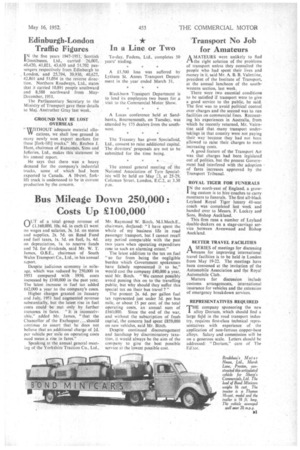Bus Mileage Down 250,000: Costs Up £100,000
Page 35

If you've noticed an error in this article please click here to report it so we can fix it.
OUT of a total group revenue of £1,160,000, 10s. 4d. in each £1 went on wages and salaries, 3s. Id. on stores and supplies, 2s. 5d. on Road Fund and fuel taxes, Is. 3d. on fuel, Is. 4d. on depreciation, Is. to reserve funds arid 7d. for dividends, said Mr. W. T. James, 0.13.E., chairman of South Wales Transport Co., Ltd., in his annual report.
Despite judicious economy in mileage, which was reduced by 250,000 in 1951 compared with 1950, costs increased by £100,000 in the past year. The latest increase in fuel tax added £42,000 a year to the company's costs.
Higher charges granted in January and July, 1951 had augmented revenue substantially, but the latest rise in fuel costs could be met only by further
increases in fares. " It is inconceivable," added Mr. James, "that the Chancellor of the Exchequer. ... should continue to assert that he does not believe that an additional charge of Id. per vehicle per mile on operating costs need mean A rise in fares."
Speaking at the annual general meeting of the Yorkshire Traction Co., Ltd.,
Mr. Raymond W. Birch, M,I.Mech.E., chairman, declared: "I have spent the whole of my business life in road passenger transport, but I cannot recall any period comparable with the past two years when operating expenditure rose to such an alarming extent."
The latest addition to the tax on fuel "so far from being the -negligible burden which Government spokesmen have falsely represented it to be," would cost the company £40,000 a year, said Mr. Birch. "We cannot possibly avoid passing this on to the travelling public, but why should they suffer this special tax on their bus travel ?"
The present 2s. 6d. per gallon fuel tax represented just under 3d. per bus mile, or about 15 per cent. of the total operating costs, an annual sum of £160,000. Since the end of the war, and without the subscription of fresh capital, the concern had spent £859,000 on new vehicles, said Mr. Birch.
Despite continued discouragement and handicap by discriminatory taxation, it would always be the aim of the company to give the best possible service at the lowest possible cost.




















































































